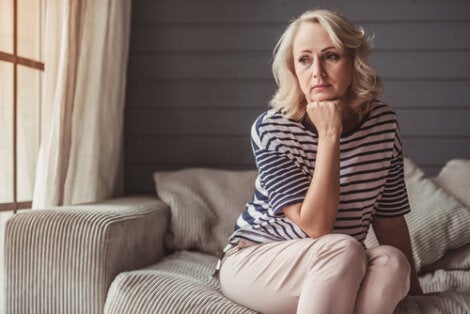Living with a Chronic Illness during the Pandemic


Written and verified by the psychologist Valeria Sabater
Diabetes, rare diseases, cancer, kidney failure, multiple sclerosis, Crohn’s disease, respiratory disorders… People suffering from chronic illness continue to be one of the most vulnerable groups during the ongoing pandemic. However, while they may be at higher risk of becoming seriously ill with coronavirus, they’re often better prepared to cope with the psychological impact of the pandemic.
In many cases, chronic conditions mean constant health worries and frequent hospital trips. For those who receive this kind of diagnosis, life is often never quite the same again. The world takes on a different color, a new rhythm, and stress becomes a constant companion on a day-to-day basis. And if things were tough before, the pandemic has only made them more complicated.
Fear, fatigue, frustration, anguish… Those who suffer from chronic illness often experience many emotions over the course of a single day. For many, the hospital is like a second home. Whether old or young, active or housebound, all of them, almost without exception, will currently be struggling to process a whole range of conflicting emotions, many of which will be hard to put into words.
For many of those with chronic illness, lockdown and self-isolation will be nothing new. Watching life pass by from behind a window is something that many know all too well. But while the rest of the world is slowly starting to regain some sense of normalcy as the lockdown gradually begins to ease, those with chronic illnesses are forced to stay at home. Coronavirus is often more aggressive in those who already have an underlying illness. As such, people with chronic conditions continue to be one of the most at-risk subsections of the population.

Dealing with chronic illness: vulnerable but tough
People with chronic illness often have a rich history that goes far beyond their health problems. Their life-story is often one of resilience, overcoming hardship, coming to terms with their own vulnerability and physical limitations, and trying to face each day with strength and courage. In many cases, it’s about finding the will to keep living.
As a result, many of them are emotionally well-equipped for life during the pandemic. The skills they’ve acquired over many years of fear and anguish, health scares, and weeks spent confined to a hospital bed stand them in good stead. While it’s true that the arrival of the pandemic has brought added difficulty to their lives, many patients with chronic illnesses have found it easier to adapt to the lockdown than the rest of the population.
Living with pre-existing health conditions: danger is nothing new
People with chronic illnesses often live in constant fear for their health. Generally speaking, they tend to experience more than one limitation in their daily lives. Each new day can bring more than one new danger that must be understood, detected, and avoided. For them, the “new normal” born of the pandemic is, in some ways, vaguely familiar. However, it’s a world where they still have to be far more careful than the rest of the population.
Who’s most at risk of coronavirus?
When we talk about “vulnerable people” who are at a greater risk of suffering serious complications if they contract coronavirus, we’re not only referring to the elderly. It’s important to remember that this subsection of the population is much broader and more diverse than you might first think.
- For example, this group includes those suffering from rare diseases.
- The elderly, those over 60 years old, and those living in nursing homes.
- The term “vulnerable” also applies to patients with cardiovascular diseases, kidney failure, diabetes, arthritis, multiple sclerosis, and cancer.
- Last but not least, it also includes patients with mental and psychiatric disorders. Generally speaking, those who suffer from schizophrenia, eating disorders, chronic depression, and borderline personality disorder are also more likely to develop other serious health problems.
Lockdown has helped us better understand the lives of those with chronic illness
The ongoing pandemic has served as a tremendous social equalizer. Lockdown has meant that we’ve all been forced to spend our days within the four walls of our own homes, in order to protect ourselves and to curb the rate of infection.
Children, adults, and the elderly, the sick and the healthy… We’ve all faced great anguish over the past few months. The pandemic has brought home the realization that none of us is immune to sickness and disease.
During this time, however, many of us have also come to realize that some members of society have it far worse than others. We’ve become increasingly aware of the needs of the most vulnerable, learning that many could do with an extra helping hand on a day-to-day basis. But now that the end of lockdown is within sight, it’s important to remember that, for the most vulnerable, life may continue to be limited for many months to come.
While most of us are beginning to regain some sense of normalcy, heading to work, playing sports, and meeting up with friends, those with chronic illnesses continue to be at risk.

The privilege of good health and the value of strength
Today, our reality has been transformed by the pandemic. We’ve learned to appreciate what a privilege it is to be healthy and gained a greater understanding of the strength required to live with serious illness on a daily basis. For many, it means financial struggles, relapses, treatments, and constant hospital trips.
We’ve all faced our own fair share of problems during the lockdown. As such, it’s impossible not to admire and respect those who deal with similar hardships throughout their whole lives. We now understand what it means to live without a vaccine, that there’s no miracle cure that can restore the life we took for granted overnight.
This text is provided for informational purposes only and does not replace consultation with a professional. If in doubt, consult your specialist.








